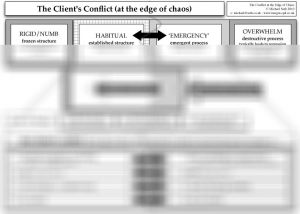About our CPD Resources
For the last few years, all of these have been publicly available, but from now on - as previously announced - access to most of the resources is restricted to subscribers/members of the site.It is free to register for the site, and it only takes a minute - all you need to do is give your name and email, and you will receive a confirmation email. As a member of the site you will then receive occasional newsletter updates, never more than 6 per year (usually it’s about 4).
Once you have registered, every time you want to access any of the resources, all you need to do is log-in to the site, using the log-in link in the top right corner of each page. You are welcome to use and distribute these materials, including for your own teaching, as long as you reference them and observe the copyright, by keeping copyright details visible.

Woodman, M. (1992) Leaving My Father’s House
Book Review:Woodman, M. (1992) Leaving My Father's HouseBook Review to be completed. Please feel free to submit your own comments below to be included in the review.Reference: Woodman, M. (1992) Leaving My Father's House. Shambhala.

Yalom, I. (1967, 2005) Theory and Practice of Group Psychotherapy
Book Review:Yalom, I. (1967, 2005) Theory and Practice of Group PsychotherapyBook Review to be completed. Please feel free to submit your own comments below to be included in the review.Reference: YYalom, I. (1967, 2005) Theory and Practice of Group Psychotherapy. [...]

Yalom, I. (1989) Love’s Executioner and Other Tales of Psychotherapy
Book Review:Yalom, I. (1989) Love's Executioner and Other Tales of PsychotherapyBook Review to be completed. Please feel free to submit your own comments below to be included in the review.Reference: Yalom, I. (1989) Love's Executioner and Other Tales of Psychotherapy. [...]
Yalom, I. (1993) When Nietzsche Wept
Book Review:Yalom, I. (1993) When Nietzsche WeptBook Review to be completed. Please feel free to submit your own comments below to be included in the review.Reference: Yalom, I. (1993) When Nietzsche Wept. Harper Collins.
Body Psychotherapy and the Body in Supervision – Interview for CONFER (2013)
In this interview, Jane Ryan from CONFER was asking Michael about Body Psychotherapy, the role of the body in our emotional lives, and the body in supervision, in preparation for the upcoming event in the series 'LIVE SUPERVISION - THE [...]
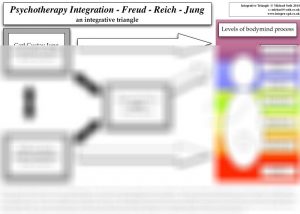
Psychotherapy Integration – an Integrative Triangle Freud – Reich – Jung (2014)
This handout is a graphical summary of an old idea from 1994 and based on a 2002 presentation: An Integrative Triangle: Freud, Reich and Jung (1994). To gain access to the full resource, please log-in if you are a member [...]
Edge of Chaos (2014)
This handout is a summary of a flip chart which I put together on a CPD weekend I was running with Nick Totton. You can find some traces of some earlier handouts, but this is a more comprehensive formulation for [...]
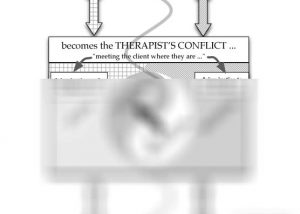
Edge of Chaos – Client’s Conflict becomes Therapist’s Conflict (2014)
This handout is a summary of a flip chart which I put together on a CPD weekend I was running with Nick Totton. You can find some traces of some earlier handouts, but this is a more comprehensive formulation for [...]
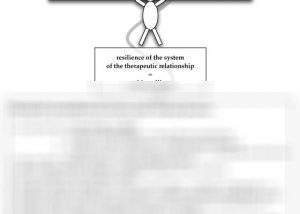
Edge of Chaos Therapist’s Internal Process – Steps (2014)
This handout is a summary of a flip chart which I put together on a CPD weekend I was running with Nick Totton. You can find some traces of some earlier handouts, but this is a more comprehensive formulation for [...]

The Diamond Model of Clarkson’s 5 Modalities of the Therapeutic Relationship (2014)
Whilst psychotherapy integration has been one of the most necessary, creative and productive developments in our field over the last 20 years, 'integrative' is in danger of becoming another meaningless sound-bite. What does our integration include, and what doesn't it? [...]
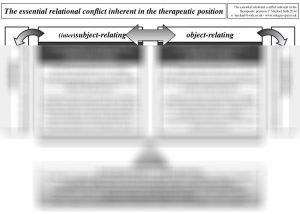
The Essential Relational Conflict Inherent in the Therapeutic Position: Object- versus Subject-Relating (2014)
This handout crystallises the essential tension inherent in the therapeutic position, between: 'I-it' object-relating (which can be both deeply healing and deeply wounding) on the one hand, and dialogical 'I-I' subject-relating (which can be both deeply healing and deeply wounding) [...]

Working with Sadism – an embodied relational approach (Morit Heitzler 2014)
Based on a presentation at CONFER in December 2014, this paper explores the complex identifications which occur in the therapist's countertransference when working with a horrifically traumatised client who had been on the receiving end of life-threatening sadism for a [...]

Effective Ways of Relating to the Patient (2015)
This is the presentation given at public workshops in Lahore and Islamabad in August 2015, to a mixed group of the general public, psychology students, and helping professionals including psychiatrists. The overall idea is to understand the different kinds of [...]

The Wounding and the Wounded Healer (CONFER 2013)
Whatever therapeutic or philosophical language we use to become aware of, reflect on and articulate our own wounds - developmental, characterological, systemic or archetypal, for example - each tradition we train in and subscribe to has its own wounds. These [...]

We Are All Relational, But Are Some More Relational Than Others? (2013)
Discussant Paper in response to Ray Little: "The New Emerges out of the Old - An Integrated Relational Perspective on Psychological Development, Psychopathology and Therapeutic Action”. Building on Ray Little's integration of humanistic TA with both traditional and relational psychoanalysis, [...]

Broken Boundaries, Invaded Territories (Morit Heitzler 2013)
One of the most excruciating aspects of trauma is the invasion or collapse of boundaries, not just in the moment of trauma, but as lasting damage. Traumatised clients usually bring to therapy an ongoing background feeling of threat: both to [...]

Bodymind and Parallel Processes in Supervision (CONFER 2013)
This presentation was prepared as an introduction to a supervision masterclass organised by CONFER in January 2013. Here I spell out how bodymind principles might be applied to supervision, bringing attention to the actual non-verbal messages by which parallel process [...]

The Therapist’s Embodied Presence in the Transformative Repair of Relational Breakdowns (CONFER 2012)
Enactments seem to occur suddenly, when we are caught unawares and plunged into them. But from outside the intersubjective entanglement it is apparent that they build up slowly, increasingly, over time. Before we become implicated in an obvious, explicit rupture, [...]

‘Using’ the Body or Engaging with Bodymind? (CAPPP 2012)
Embodiment as a paradoxical relational process Since its origins in Freud and the zeitgeist of the late 19th century, psychotherapy has struggled with and against the limitations arising from a mind-over-body paradigm and its traditional bias towards the verbal-reflective mind. [...]

The Relational Turn in Body Psychotherapy (2012)
Based on an interview with Nancy Eichhorn in preparation for the 2012 International Body Psychotherapy conference in Cambridge, UK - she wrote it up, included her own comments and perspective and I then helped with the editing to get it [...]

The Bodymind Reality of Internal Objects in the Transference (CONFER 2011)
In the psychodynamic tradition we take it for granted that early relational dynamics are being replicated in the transference, often creating binds and dilemmas that in turn have a regressive effect on the therapist. This is such a powerful principle [...]
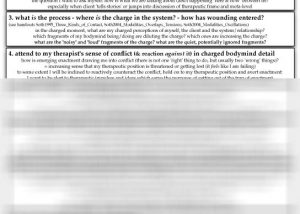
Steps towards Apprehending the Intersubjective Systemic Bodymind Phenomenology of Enactment (2011)
This handout is an evolving draft, presenting a sequence of reflective questions and alerts as to where to put my focus of attention when as a therapist I feel caught in an enactment. The starting point is my awareness that [...]

Using EMDR with Various Types of Developmental Trauma (Morit Heitzler 2011)
Complex trauma is based on underlying developmental trauma. However, developmental trauma is a very broad, non-specific category. There are several typologies and classification systems of developmental trauma available, with various degrees of usefulness to EMDR practitioners.Having researched and assessed these [...]

Book Review: “Explorations in Transactional Analysis – The Meech Lake Papers” by William F. Cornell (2011)
This book review was written for the International Journal of Transactional Analysis: “Since his original psychotherapeutic trainings many decades ago in Radix and Transactional Analysis, Bill Cornell (working in Pittsburgh, US) has been at the forefront of the creative endeavour [...]

